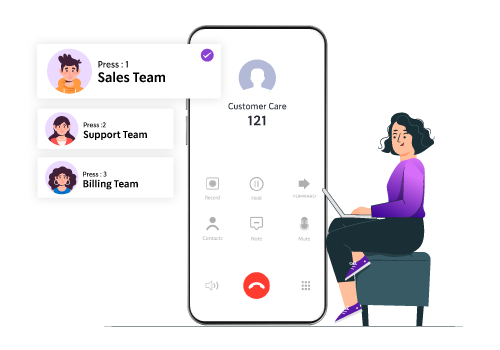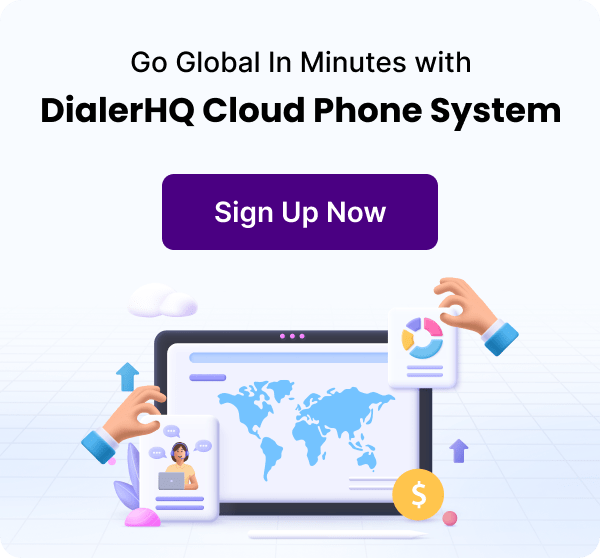Senior Writer: Hiba Ali
If the issue is typical or complex and requires human interaction to understand, the IVR route the callers to a human agent who can better handle their needs.
IVR software integrates computer and telephone technologies to improve IVR call flow and reduce wait times, increasing customer satisfaction.
An IVR allows you to manage inbound calls by gathering information about the client inquiry before automatically assigning the IVR call to the correct department.
What is IVR (Interactive Voice Response)?
Interactive voice response (IVR) is an automated business phone system technology that interacts with callers and greets and acts on information it collects from the callers. IVR uses pre-recorded messages and provides menu-selecting options or speech recognition features to help the callers to proceed toward the right departments or specialist agents. According to the caller’s choices, the IVR offers further problem-solving options.

"Businesses can save time and money by using IVR (Interactive Voice Response) to handle regular customer service questions, freeing up live operators to handle more complicated problems. IVR may enhance productivity and streamline the customer experience overall, making it a useful tool for companies of all sizes."
How Does an IVR Work?
When the auto-attendant of your ACD greets a call, your IVR kicks in & presents the phone menu to the caller.
In IVR phone menus, callers can choose between different options according to their needs. The caller can interact with the options provided by the IVR by hitting the phone’s touch-tone keypads. In these modern times, some cloud contact centres are using a voice response IVR system that recognizes the voice commands of the caller and responds accordingly.
(Callers can also interact with the system through voice response through speech recognition in newer cloud contact centres)

Through the IVR self-service process, the caller can resolve their query or purpose for calling. IVR authorizes the system to determine the agents with the skills to handle the caller’s needs, and the Automatic Call Distribution (ACD) routes the IVR call to the appropriate live agent. This is the qualification phase, which triggers the skills-based routing feature.
What is the Use of the IVR System?
It is common for companies and contact centers to use interactive voice response systems, or IVRs, to route calls based on options made by the caller. For example, the IVR can determine if the caller wants to contact the billing or technical support through these choices.
Traditionally, people only used it to organize call queues in call centers. For example, companies used it to inform callers that the system would record their incoming calls and ask if they wanted to proceed. It also provides information like promos, updates, or other vital information or instructions.

Since they were first developed, IVR systems have come a long way and are now often used to automate basic processes to give callers self-service options. IVRs can directly handle these processes in place of call center agents to resolve simple customer needs and queries.
Some examples of IVR tasks include:
1. Account balance inquiries
2. Obtain account information
3. Change passwords or PINs
4. Check the pricing, directory, etc., of products.
6. Completing surveys and lead forms
7. Transfer funds or make small payments
IVR menus are the response systems that assist customers during the IVR experience. For example, callers can use the IVR menu with the touch-tone keypad selection or by their voice input.

We must admit that we all have heard this a million times while calling customer care “press 1 for customer service or press 2 for talking to an executive,” that is the programmed or, we can say, the pre-recorded message of an IVR menu.
An IVR is like a tree in which you can create as many branches of options for your caller as you want.
But make sure your company’s IVR system options should be simple and easy.
How to Set Up the IVR for Your Business?
In the old days, IVR was totally different to what we thought and setting up an IVR was a way more complicated process, But thanks to the cloud-based call centre solutions, now you can set up an IVR with some easy steps.
Follow these IVR setup best practices to ensure both customers and agents benefit from your interactive voice response system:

Make pre-recorded call prompts and menus as simple as possible:
1. Provide clear and easy-to-understand prompts (hire a voice pro if needed or use an AI voice generator to achieve a professional level at a fraction of the cost).
2. During the IVR interaction, provide a way to switch to a live agent at any time.
3. Make sure IVR scripts and call menus are updated frequently.
4. For instant access to customer information, integrate third-party CRM tools.
5. Rather than putting customers on hold, let them schedule automated callbacks.
6. Prepare several alternative routing options in case your preferred agent is unavailable.
7. Ensure effective menus/announcements by establishing/studying automatic analytics/recordings.
What Are the Benefits of IVR Technology?
Here are some of the most common benefits and advantages you can expect from implementing a modern IVR in your contact center:

1. Leads to Better Customer Service
It is not fun to waste your time calling a call center, but that is precisely what happens. The longest wait to get a live agent, the extended hold times because the agent is not adequately equipped to deal with an issue, and the constant transference to different departments are all problems. Worse still are times when their concern is not resolved.
In a well-designed IVR, every step serves a purpose. Either the IVR provides callers with the information they seek or determines their needs so that the appropriate agent is transferred to them immediately.
Consequently, customers will feel that choosing your company is not a waste of time and money since first contact resolution (FCR) increases, and they will not need to call again.
2. Helps You Project a More Professional Image
There used to be a high cost associated with IVR systems, without even considering the hardware and infrastructure required to support them, so IVR is still associated with enterprise-level solutions that only large corporations can afford.
However, that’s no longer the case. IVR is now part of most cloud contact center solutions, which are also more affordable than their on-premise counterparts.
Small or medium-sized businesses can benefit from an enterprise-level IVR phone system that can enhance their professionalism without breaking the bank.
3. Improves Agent Performance & Morale
A call center agent’s life will be much easier with an automated IVR, which would reduce the number of calls a call center agent has to handle. It is not designed to replace agents but rather to make their lives much more manageable.

In call centers without an IVR, inbound calls can be too high, resulting in agents receiving calls that they aren’t prepared to handle.
As a result, agents become frustrated when they don’t know how to resolve customer problems. Frustration leads to anxiety and despair, leading to apathetic and unproductive employees on the verge of quitting.
An IVR can reduce the number of calls agents handle by resolving simple queries. As part of the skill-based routing feature, it ensures agents receive only calls they can manage. Consequently, call center agents are more efficient, productive, and happy.
4. Continuous Availability 24/7
One of the best things about IVR is that it doesn’t require humans to function; once programmed, it will continue to operate unless otherwise configured.
In other words, it doesn’t need sleep or rest as we do. In the middle of the night, customers can call your company and receive a greeting from an automated machine, depending on its settings. It can even process simple transactions.
5. Reduces Manual Errors
Unlike human receptionists, IVRs are automated, so they do not make mistakes. Compare this to having a human receptionist handle inbound calls for your company.
However, manually managing incoming calls can also cause errors, such as routing calls to the wrong department or agent and being overwhelmed by high call volumes.
The IVR system in your contact center ensures that every call follows the same logical sequence incorporated into the phone menu.
As a result, many call handling errors are reduced because humans are no longer required to make judgment calls. Your business benefits from knowing that each caller receives the same IVR experience when you automate the way it receives calls.
IVR Features Checklist: Comparing Top IVRs
| P.O.C | DialerHQ | Nextiva |
|---|---|---|
| Pricing | Starting at $0 | Starting at $18.95/user/month |
| Sticky Agent | Yes | No |
| Call Braging | Yes | Yes |
| Power Dialer | Yes | Yes |
| Multi-Lingual IVR | Yes | Yes |
| Auto Attendant Script | Yes | Yes |
| Call Recording | Yes | Yes |
| Call Queuing | Yes | Yes |
| Free toll-free number | Yes | Yes |
| Real-time analytics | Yes | Yes |
| Intelligent call distribution | Yes | Yes |
| Integration |
|
|
Examples of automation with IVR
IVR automation is highly beneficial for business. As petty or repetitive tasks can be automated, customers won’t need to speak with executives about such tasks. This will be time-saving and convenient for both customers as well as businesses. Issues will be quickly resolved, and support teams can be free to resolve other important or complex queries.
Let’s look at examples of how IVR can automate the processes:
1. Knowing Account Balance
With automation in banking IVR, customers can check the existing balance in their accounts and their credit card dues, etc.
2. Order Details
Orders status and details can be known by entering a few details like order ID or phone number.
3) Product Information
Information related to several products or services can be gained through IVR.
4) Payment Automation
Some companies accept payment through IVR as IVR systems can pull out the saved payment information. This can be done without speaking to an agent.
5) Conducting Short Surveys
Businesses can conduct surveys on the products or services through IVR.
6) Pins and Password
Tasks like setting or changing pins or passwords can be done through IVR by customers without consulting an agent.
Hence these are some examples of automation brought in IVR by companies wherein customers don’t need the assistance of a customer services rep.
IVR System Challenges: And How to fix them?
1) Overly complex navigation
Solution: Simplify call flow navigation.
2) Impersonal customer service
Solution: Provide escalation options.
3) Excessive wait times
Solution: Improve call flows using data and enable Q-for-Me callbacks.
How do IVRs help the customer experience?
IVR can elevate customer experience effectively. There are several ways in which a company can increase customer satisfaction by improving support services through IVR. With the IVR system, an organization can offer effective solutions and tailored customer experiences. Let’s look at the aspect of IVR that improves the customer experience.

1. Call Routing
IVR entails features that gather information regarding the query of the customer and then, on the basis of that information, transfer the call to that customer support representative designated to solve that particular problem.
2. Automated Services
Queries like knowing the account balance, order status, etc., can be stated by IVR automatically without transferring the call to any representative. With this, the customers don’t have to stay on hold for long and wait for a support rep to get free for such petty queries.
3. Rapid Processing
IVR systems have never been so much sophisticated. With features like directed speech, customers can be easily navigated to the desired department quickly.
4. Comprehensive Options
Nowadays, on IVR calls, the system asks you to state the reason for your call in a few words. After that, it directly provides you with options related to your query. So the process has gotten easy, quick, and simplified.
5. Speech Recognition
The speech recognition feature automatically navigates the customer where they need to go. So now customers don’t need to listen carefully and press options a number of times till they reach the representative.
Hence, these are some of the important aspects with which customers gain a better experience as their issues get resolved quickly without any hassle.
How to Choose the Best IVR for Your Business?
From small to large businesses, IVR has assisted them in effectively controlling costs, freeing up the workforce, and offering a better customer experience. But choosing an effective IVR that matches the requirements of your business is a tedious task.
Below are the steps that will assist you in selecting the best IVR system for your business.

1. Integration
IVR that can be easily integrated with the systems in your organization is highly important as this will allow you to automate the process to a considerable extent. This type of IVR might seem costly at first, but it will be cost-efficient in the long term.
IVR must be easy to navigate and entail advanced functionalities like speech recognition. This will enhance customer experience and eventually lead them to effective resolution. No customer wants to stay on call for a long time and keep on hopping between menus and not get a resolution at the end. So this feature is a must.
3. Cloud-Based System

If the IVR system is cloud-based, it will make it easy for you to manage the system and relevant data. It gets easily integrated with the telecommunications system, takes all the data, and stores it in the cloud server. This is a must-have in current times.
4. Free Trial
Nowadays, there are too many ivr service providers, and most provide similar services and features. To choose the right provider from them, you need to actually experience whether the features provided are competent, the uptime promised is provided, processes are error-free, etc. So a free trial must be availed, and a proper evaluation must be done on that basis.
5. Effective Service
Apart from features and functionalities, the availability of support from the vendors is an equally important aspect. You should conduct in-depth research and evaluate the support provided by different vendors and then opt for one that offers the best.
Bottom Line
It’s no secret that customer service interactions significantly impact the customer’s experience. For example, 49% of customers say waiting times are the most frustrating part of service calls. An IVR system can reduce this wait time and provide your customers with the help they need faster.
Similarly, IVR software is evolving today, with natural language processing technology expanding how callers can interact with computers.
An adequately deployed IVR system significantly enhances customer service and call center operations.
IVR systems are a cost-effective solution for businesses that want to simplify the entire contact center experience, large enterprises handling large call volumes, and companies wishing to streamline the whole call center experience.
Considering what IVR telephony is and why your business needs it, it is time to search for contact center providers offering an IVR system.
FAQs
It is usually $0.02 to $0.10 per minute of talk time for Interactive Voice Response solutions. On-premises IVRs can cost more than $1,030 - $1,500 per line, not including configuration and maintenance, as opposed to cloud-based IVRs.
In a call center, interactive voice response (IVR) is a telephony system that enables businesses to interact with customers through automated menus. It often allows customers to self-serve for faster service.
The two types of IVR systems are inbound and outbound. Inbound IVRs handle incoming calls, while outbound IVRs make calls entirely or partially by automating the process.
Smart IVRs are Interactive Voice Response systems that respond to callers' real-time responses rather than static, linear menus.
IVR is a telephone system that integrates prerecorded messages and text-to-speech technology with a dual-tone multi-frequency (DTMF) interface to allow callers to provide and access information without talking to a live representative.
Hiba is a seasoned expert with extensive experience in the dynamic and ever-evolving field of Voice over Internet Protocol (VoIP) and cloud telephony. She is passionate about leveraging VoIP technology to help companies gain flexibility, scalability, and cost savings. Her journey in this domain has been marked by a commitment to staying at the forefront of emerging trends and technologies, ensuring that they provide readers with the most up-to-date and relevant insights.
Updated : May 14, 2024

Subscribe to our newsletter & never miss our latest news and promotions.





